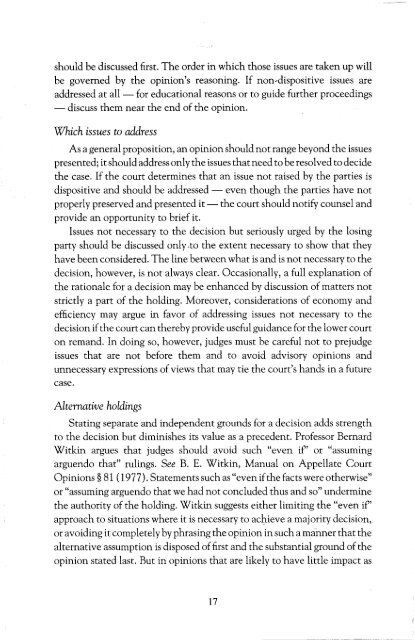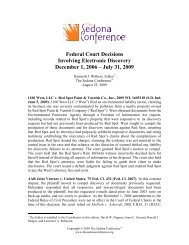Judicial Writing Manual - Federal Judicial Center
Judicial Writing Manual - Federal Judicial Center
Judicial Writing Manual - Federal Judicial Center
Create successful ePaper yourself
Turn your PDF publications into a flip-book with our unique Google optimized e-Paper software.
should be discussed first. The order in which those issues are taken up will<br />
be governed by the opinion's reasoning. If non-dispositive issues are<br />
addressed at all - for educational reasons or to guide further proceedings<br />
- discuss them near the end of the opinion.<br />
Which issues to address<br />
As a general proposition, an opinion should not range beyond the issues<br />
presented; it should address only the issues that need to be resolved to decide<br />
the case. If the court determines that an issue not raised by the parties is<br />
dispositive and should be addressed - even though the parties have not<br />
properly preserved and presented it - the court should notify counsel and<br />
provide an opportunity to brief it.<br />
Issues not necessary to the decision but seriously urged by the losing<br />
party should be discussed only,to the extent necessary to show that they<br />
have been considered. The line between what is and is not necessary to the<br />
decision, however, is not always clear. Occasionally, a full explanation of<br />
the rationale for a decision may be enhanced by discussion of matters not<br />
strictly a part of the holding. Moreover, considerations of economy and<br />
efficiency may argue in favor of addressing issues not necessary to the<br />
decision if the court can thereby provide useful guidance for the lower court<br />
on remand. In doing so, however, judges must be careful not to prejudge<br />
issues that are not before them and to avoid advisory opinions and<br />
unnecessary expressions of views that may tie the court's hands in a future<br />
case.<br />
Alternative holdings<br />
Stating separate and independent grounds for a decision adds strength<br />
to the decision but diminishes its value as a precedent. Professor Bernard<br />
Witkin argues that judges should avoid such "even if' or "assuming<br />
arguendo that" rulings. See B. E. Witkin, <strong>Manual</strong> on Appellate Court<br />
Opinions § 81 (1977). Statements such as "even if the facts were otherwise"<br />
or "assuming arguendo that we had not concluded thus and so" undermine<br />
the authority of the holding. Witkin suggests either limiting the "even if'<br />
approach to situations where it is necessary to acllieve a majority decision,<br />
or avoiding it completely by phrasing the opinion in such a manner that the<br />
alternative assumption is disposed of first and the substantial ground of the<br />
opinion stated last. But in opinions that are likely to have little impact as<br />
17

















